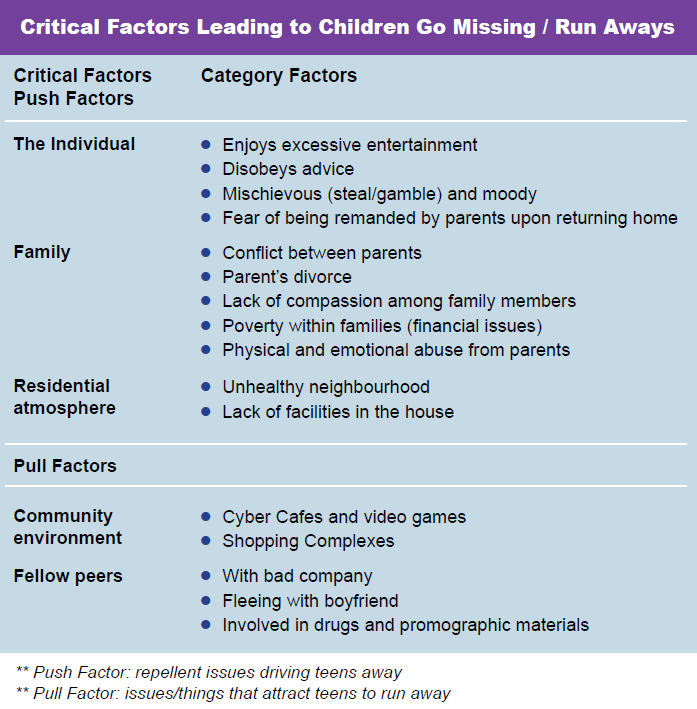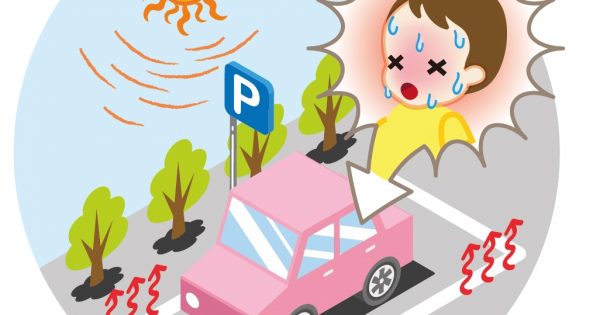In Malaysia, such as it is elsewhere in the world, the majority of missing/run away children come from family conflicts (i.e. domestic violence, parent drug/sex abuse, neglect, etc.) and peer influence, but there are other reasons:

Teens that run away from home are exposed to things like drugs, alcohol, sexual violence, and physical violence that may result in poor mental health. In addition, the children may feel the direct impact of physical and emotional distress due to lack of family support, or financial constraints.
Signs that your teen may be considering running away:
- Extreme mood swings or rebelliousness.
- Very low self-esteem.
- Becomes unresponsive, isolates himself and goes into a depressive state.
- Withdrawal from society (e.g. friends and family).
- Sudden drop in school grades and increased incidences of truancy.
- Notable change in appearance, such as major weight loss or lack of attention to personal hygiene.
- Lying or stealing.
- Drug or alcohol use.
- Has a suicidal tendency.
- In possession of a dangerous weapon or paraphernalia.
Studies Show
Children are more prone to deviant behaviour such as running away from home when parents lack the skills in minding and showing their affection, or are harsh and inconsistent.
Preventing The Problem
- Mend relationships before it turns into a crisis. Whatever the argument, always reassure them of your unconditional love.
- Be a good listener and empathize towards their problems.
- Argue maturely, your teen will appreciate it.
- Create a trusting parent-child relationship by allowing them certain age-appropriate freedoms and provide more opportunities for them to discover themselves and explore broader possibilities.
- Ask them about their day, what’s troubling them, know their friends or discuss any intimate issues.
- Teach problem solving and coping skills (i.e. responsibility, accountability, etc). Make sure they know that it’s better to confront a problem than run away from it.
- Make them feel comfortable approaching you for support, guidance and advice when they need it – don’t be overly judgemental or condescending.
- Identify the triggers that lead to risky decisions and take pre-emptive actions to avoid it manifesting even further.
- Never dare your child to run away.
How To React/Respond When/If They Return
- Don’t go into details yet but let them know you’ve been worried and you need to talk about what’s been happening.
- Don’t say things like “I knew you’d have to come crawling back!” Even if it’s tempting to convince them that you were right or your ideas were better. Be the adult and apply more persuasive language.
- If your teen comes home late, don’t scold or beat them. Instead, employ poise, patience and creative wisdom. It’s not a sign of weakness; it’s actually a display of matureness in authority which commands your child’s respect without having to lift a single finger.
- Try to work together on ways to make things different and don’t avoid the problem that led to your teen running away in the first place. The key to all good relationships is toleration, communication, understanding and no small amount of trust, so don’t be too over-protective or egotistical.
- Talk about the problem, not the person – don’t play the ‘blame game’.
- If your teen refuses to talk to you or you can’t seem to get anywhere, get someone whom you and your child both respect to mediate the discussion.

Don’t Worry
Sometimes even the best of us make mistakes & say/do things we don’t mean in the ‘spur of the moment’. It doesn’t mean you’re a bad parent.
Parents, first and foremost, need to equip themselves with positive parenting skills, stress management, communication and listening skills. Keep working on your relationship and involve them more in setting up rules around the house. Running away can be a sign that something is seriously wrong; so don’t be ashamed to seek professional help.
An educational contribution by Malaysian Association for Adolescent Health.







Comments